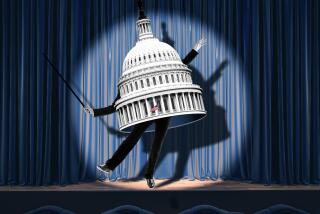NEA Nominee Hearing Opens on Cordial Note
- Share via
WASHINGTON — Declaring “we need the freedom for art to flourish,” President Bush’s nominee to head the National Endowment for the Arts publicly challenged Friday a conservative-led movement in Congress to slap content restrictions on federally funded arts projects.
But demonstrating the skills that have established him as a consummate consensus-builder, Portland, Ore., lawyer, singer and arts patron John E. Frohnmayer carefully avoided a head-on confrontation with Sen. Jesse Helms (R-N.C.), leader of the funding-control movement.
Helms was the author of an amendment pending before a House-Senate conference committee that would prohibit the spending of federal money for artworks that could be perceived by anyone as offensive, sacrilegious or indecent. The conference committee is scheduled to begin debate on the bill Monday or Tuesday.
Frohnmayer also declined to take a public position on another aspect of the crisis enveloping the arts endowment, a separate amendment to the endowment funding bill adopted by the Senate Appropriations Committee that would ban federal support for five years to two regional arts groups that organized shows containing allegedly offensive photographs.
The occasion was Frohnmayer’s confirmation hearing before the Senate Labor and Human Resources Committee, chaired by Sen. Edward M. Kennedy (D-Mass.) at which Frohnmayer received a unanimously cordial bipartisan welcome. Frohnmayer is expected to have little difficulty gaining confirmation from the full Senate. A committee vote on the nomination could come next week.
Frohnmayer told the Senate panel that restricting or cutting off federal support for the arts would help push control of the arts even further into the hands of a closed cadre of cognoscenti. “I think the way to assure elitism in the arts is to cut off federal funding,” Frohnmayer contended.
He argued that the national endowment’s most important mission is to continue to increase access to the arts throughout the country and to try to continue to break the lock on control of the arts. The situation, many critics contend, unfairly favors big arts institutions in large cities--particularly in the Washington-New York-Boston corridor.
“We all know that the endowment and its central role in the arts are under attack from some quarters,” Kennedy said. “The endowment has too important a role to play to capitulate to threats of censorship, or the extreme and unwarranted intrusion of those who oppose federal support for the arts.”
Frohnmayer went to considerable trouble to dance around politically sensitive subjects, declining to comment on the blacklisting amendment and specifically declining to address questions by reporters on whether he believes mistakes were made in the national endowment grant-making process in financing of the two exhibitions in question.
In one, the Southeastern Center for Contemporary Art included in a 1988 show a photograph of a crucifix immersed in urine. The other controversy involves the sponsorship by the Institute for Contemporary Art at the University of Pennsylvania of a show of work by the late photographer Robert Mapplethorpe.
But in an exchange in which Kennedy characterized the conservative movement to rein in the national endowment as “lively rhetoric,” Frohnmayer asserted that the Helms amendment, which critics have contended would cripple the endowment, “would be extremely difficult to administer.”
Frohnmayer, a First Amendment law expert, stopped short, however, of taking a position on the constitutionality of the Helms initiative. In a statement last week, however, the endowment flatly contended the Helms restrictions violate constitutional guarantees of freedom of speech.
Frohnmayer said, “I would hope the issue really would be judgment” in a flexible grant-review process intended to reward artistic excellence that would be compromised by “the problem of intrusion (by legislation) and the difficulty in making unfettered artistic judgments.” Pressed by Sen. Orrin Hatch (R-Utah) to explain why public funds should be expended on artworks “that the overwhelming majority might see as smut or trash,” Frohnmayer contended that judgments of artistic merit must be made along a delicate continuum “between the public trust and absolute artistic freedom.” He said statutory interference imposing inflexible definitions of what is acceptable art would compromise the arts endowment’s mission.
Sen. Paul Simon (D-Ill.) said he was concerned that “the whole atmosphere” of the debate over the endowment’s decisions risks making the arts endowment too politically gun-shy to be artistically effective. “I hope the NEA will continue to be willing to make mistakes,” Simon told Frohnmayer.
More to Read
The biggest entertainment stories
Get our big stories about Hollywood, film, television, music, arts, culture and more right in your inbox as soon as they publish.
You may occasionally receive promotional content from the Los Angeles Times.










